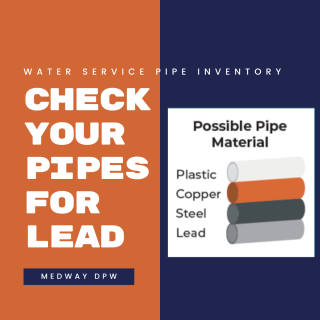Check Your Water Service Line for Lead

Water Service Pipe Inventory & Lead Service Line Replacement Program
This project will document Medway's water customers' water service pipe material. The goal is to identify any remaining pipes that may be made of lead and to develop a plan to remove and replace them with copper or plastic. Medway has documented the majority of customer pipes during its meter replacement project, but some records are incomplete, and some older homes may still have lead pipes.
- We need your help identifying the type of material of the water service pipe entering your house and reporting your results to the Town – no matter what material they are made of.
- The Town must provide MassDEP with the information by October 2024 and publish it here.
Here is how you can check your water pipe, also known as your “service line,” for lead:
Step 1: Find your service line. Find where the pipe comes through the wall or floor in the basement. (see photo below - "service lines").
Step 2: Determine the material of the water service line.
- If the pipe is white, blue, black, or green, it is plastic - skip to Step 3.
- If your pipe is metal, you will need a magnet.
- If the pipe shows green discoloration or looks like a penny, it is copper.
- Place a magnet on the pipe. If it sticks, the pipe is iron or steel.
- You may have a lead pipe if your pipe is greyish and the magnet does not stick.
Step 3: Take a picture like the one below, labeled “Water pipe/service line.” Then, report your results here. Please report your pipe results even if you do not have lead!
FREQUENTLY ASKED QUESTIONS
What if I can’t find my water service line or need help accessing it?
Please get in touch with the Town of Medway at 508-533-3275.
What should I do if I think my water service line is made of lead?
Run your tap to flush your pipes before using water for drinking or cooking.
Use only cold water for drinking, cooking, and making baby formula. Boiling water does not remove lead.
Clean your faucet’s screen (also known as an aerator) regularly.
Use an NSF-certified pitcher or faucet filter, and replace the filter according to product instructions. Learn more here
For additional tips and information, visit Protect Your Tap: A Quick Check for Lead | US EPA
Why is lead dangerous?
Lead can be found in all parts of our environment, including your home’s plumbing. Much of our exposure comes from human activities such as past use of leaded gasoline, some types of industry, and past use of lead-based paint in homes. It is a toxic metal that can be harmful to human health when ingested, especially for children, even at low exposure levels.
Learn more at: https://www.epa.gov/lead/learn-about-lead
What else is Medway doing to make sure drinking water is safe?
Medway DPW maintains a pH level in the water, which helps prevent pipe corrosion and reduce the risk of lead leaching from household plumbing. Medway conducts regular testing to check for lead.
Medway continually strives to deliver the best drinking water to you. As new challenges to drinking water safety emerge, we remain vigilant in meeting the goals of source water protection, water conservation, and community education while continuing to serve the needs of all our water users.
I have more questions about lead in drinking water. Where can I get more information?
MassDEP’s Lead in Drinking Water webpage: https://www.mass.gov/lead-in-drinking-water
Who can I contact if I have more questions?
Contact the Town of Medway at 508-533-3275 or dpw@townofmedway.org
Additional resources:
Postcard: Lead Service Line Inventory & Replacement Plan Project
| Attachment | Size |
|---|---|
| 109.19 KB | |
| 132.9 KB | |
| 35.26 KB |

